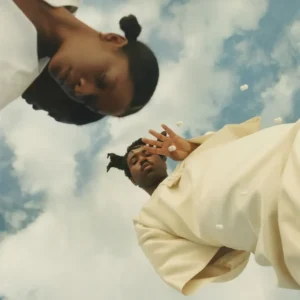Time, a relentless adversary for humanity, possesses the unique ability to truncate our most cherished moments while elongating the agony of our worst experiences. Sampha, having grappled with the profound loss of his mother in his debut album Process, returns five years later with Lahai, an album that emanates a decidedly brighter aura, casting the artist in a more optimistic and self-affirming light. In contrast to Process, which captured Sampha in the throes of mourning, Lahai unfolds as a rehabilitative journey. This time around, the 34-year-old artist centers the project around family, similar to his debut, but with a focus on emotional recovery and the pursuit of a positive state to serve as a guiding light for his young daughter.

The lead single, “Spirit 2.0,” acts as a spiritual lifeline, imploring the listener to believe that something or someone will catch them amid the turbulence of stress and despair. “Waves will catch you / Light will catch you / Love will catch you / Spirit gon’ catch you,” Sampha croons in the chorus, narrating his own healing process when surrounded by emptiness. The lush and breezy instrumentals evoke a sense of liberation, as if Sampha is finally breaking free from the clutches of depression. He even draws on Richard Bach’s fable of Jonathan Livingston Seagull, symbolizing the journey toward self-acceptance. This reference persists throughout the album and finds a poignant expression in the track bearing the bird’s name. Here, Sampha grapples with healing and journeying, leaving behind the comfort of his familiar surroundings in search of purpose. Along the way, he encounters others who share his trauma but navigate it in distinct ways, acknowledging that shared experiences don’t always translate to identical feelings. As Sampha navigates through loneliness and despair on his path to self-acceptance, he reflects on moments spent with significant individuals in his life. He holds onto peaceful memories of dancing with his significant other in the delicately produced “Dancing Circles” and confronts his dissociation from reality in “Suspended.” Sampha’s sincerity, even in acknowledging his personal shortcomings, offers a candid portrayal of his fractured emotions, revealing that years after a traumatic event, he continues to piece himself together.
The album unfolds as Sampha grapples with the relentless passage of time. The brief interlude “Time Piece” features a woman speaking in French, asserting, “Time doesn’t exist / A time machine.” In the subsequent track, “Can’t Go Back,” Sampha concedes that despite his desires, time cannot be rewound. With newfound responsibility for his daughter, he realizes the necessity of living in the present and preparing for the future, if only for her sake. It signifies a mature acknowledgment of time’s inexorable march, underscoring Sampha’s perceptible healing and growth. Approaching the feeling of self-acceptance and liberation, Sampha remains cautious of his burgeoning happiness on the penultimate track, “What if You Hypnotize Me?” He grapples with the notion that the love he seeks might be selfish, and memories continue to intrude on his present. Yet, he expresses a willingness to be hypnotized by the subject of the song in the pursuit of peace of mind. Sampha’s struggle against time is ongoing and often unappreciated. Despite the challenges, he maintains hope that he can rediscover purpose in life. Backed by a glitchy instrumental palette, Lahai presents a serene vision of the future where Sampha can find peace with his memories and create a positive environment for his family. In the aftermath of considerable time lost to grief, Lahai serves as Sampha’s convincing argument that he still possesses ample time not to be squandered.




















+ There are no comments
Add yours